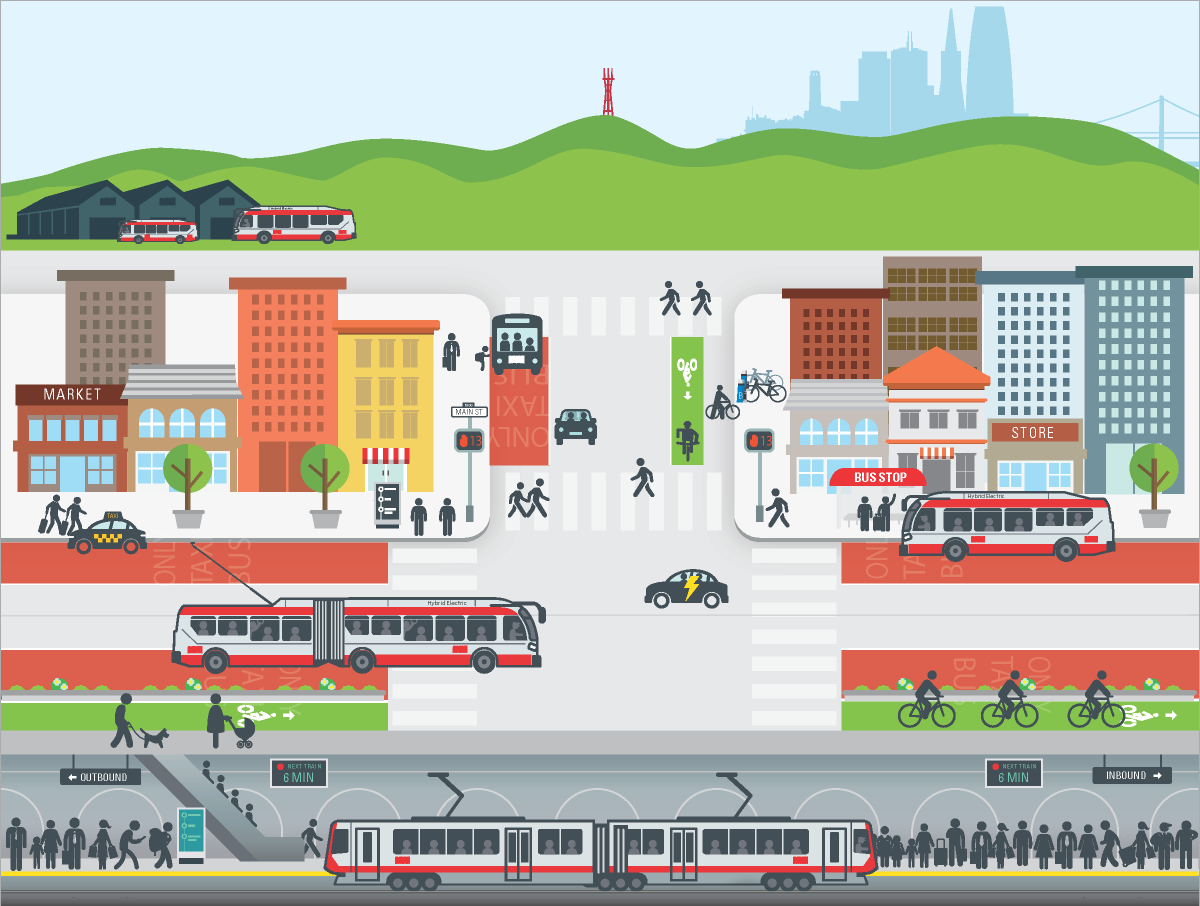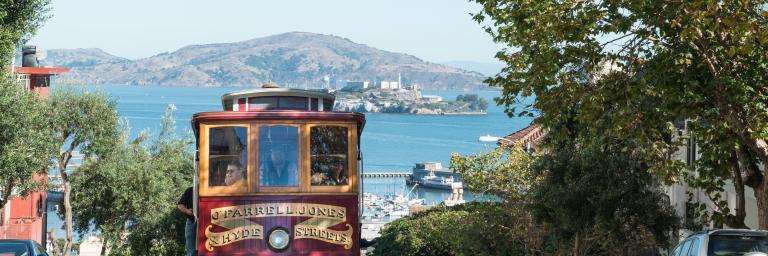
SFMTA’s multi-modal transit system and the City’s broader transportation network generate a number of environmental benefits that help to make San Francisco a healthy, resilient and equitable city. Below are just a few ways projects that support walking, biking and transit ridership will advance San Francisco's efforts towards its ambitious climate action goals.
Improved bike facilities not only help to create a bicycle network that is safe comfortable and convenient for people of all ages to bike; they have a number of environmental co-benefits:
- Bike projects help to meet the city’s climate change goals by providing a safe, comfortable way for people to get around without producing harmful emissions;
- Every trip made on a bike instead of a car helps to support the local economy, reduces traffic congestion, reduces emissions and improves air quality, which makes San Francisco more livable for everyone;
- Getting just one person to make the switch and commute by bike can reduce up to 1.9 tons of CO2 emissions annually.
Pedestrian safety projects inspire people to walk and explore their neighborhoods, support local business and reduce traffic congestion. By encouraging mode shift and reducing emissions, these projects help San Francisco meet its climate action targets.
Public transit is the cornerstone of San Francisco’s low-carbon transportation system as it reduces greenhouse gas emissions in several ways:
- Public transit increases the energy efficiency of travel as it can move a large number of passengers in a shared vehicle;
- Public transit in San Francisco is fueled by renewable fuels with a low carbon intensity;
- Public transit, and the land use planning that supports it, can lead to dense neighborhoods where trips are short and often made by transit, walking and biking.
Furthermore, transit projects can further support climate mitigation efforts in the following ways:
- Projects that improve public transit take cars off the road, moving more people, reducing congestion and helping meet the city’s climate change goals of increased low-carbon trips and reduced emissions from transportation.
- Muni improvements mean helping mitigate climate change by encouraging more trips on one of the cleanest transportation in the country. Muni accounts for just 2% of the City’s transportation related emissions.
- Muni projects support the largest fleet of zero-emission buses in the US and the cleanest fleet in California.
Shared Mobility
Shared mobility options, such as bike share, car share, scooter share and vanpools, can decrease car ownership, emissions, and vehicle miles traveled.
Private trucks and cars make up over 96% of the transportation related emissions in San Francisco. Strategic electrification of the transportation sector has the potential to dramatically help reduce emissions and harmful air pollutants from private vehicle trips that cannot be made by walking, biking or taking transit. In partnership with San Francisco Department of the Environment, San Francisco Public Utilities Commission and other city agencies and stakeholders, SFMTA developed an Electric Mobility Strategy that lays out a vision for reducing adverse public health and environmental impacts of private transportation and identifies pilots, programs, policies and partnerships to help realize an emission free transportation sector
Green street infrastructure and design can improve storm water management, increase biodiversity and improve air quality through carbon sequestration and reduced congestion. Led by San Francisco Public Works, and San Francisco Planning Department, San Francisco's Better Streets plan, policy and guidelines ensure streets are designed and built to balance utilization between all users regardless of physical abilities or mode of travel. Better Streets prioritizes people first while considering pedestrians, bicyclists, transit, street trees, stormwater management, utilities, and the livability of San Francisco neighborhoods and communities.
SFMTA's facilities modernization efforts not only ensure that San Francisco's multi-modal transportation system meets the needs of everyone who travels in the city, but will improve our transportation system’s resiliency to climate change and seismic events. Below are just a few ways the facility Building Progress Program at SFMTA supports climate and environmental goals:
- Reduced water consumption by 17% compared to 2010 rates, saving over 36 million gallons of water through tap and toilet upgrades
- Reduced energy consumption by 10% since 2009, through building upgrades and lighting retrofits
- Divert over 8,000 cubic yards of waste annually through recycling and composting efforts.
